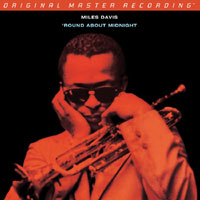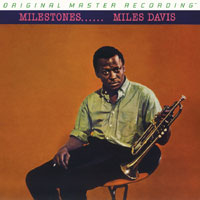Miles Davis Quintet • 'Round About Midnight
Miles Davis Sextet • Milestones
obile Fidelity has resurrected two albums from the Sony vaults that demand to find a home in every jazz collection. ’Round About Midnight and Milestones, reissued here in glorious mono sound, catch Miles Davis and his quintet/sextet in formative performances from the late 1950s of what could arguably be called post-bop modern jazz. The twelve months between the end of October 1955 and October 1956 were musically prolific ones for the 36-year-old Davis and his newly formed quintet. That group, featuring a relatively unknown John Coltrane on tenor sax, Red Garland on piano, 20-year-old bassist Paul Chambers and drummer Philly Jo Jones, was active for another four years and became one of the most popular and important jazz ensembles of the day. History has given that gathering of talent undeniable legendary status. In addition to recording four classic albums for Prestige -- Workin’, Relaxin’, Steamin’ and Cookin’ -- Miles managed to bring his quintet into Columbia Records' Manhattan studios and record ‘Round About Midnight, his first album for that label. The album had its roots in Davis’s performance of Thelonious Monk’s "’Round Midnight" at the 1955 Newport Jazz Festival in Rhode Island. His lyrical, brooding, golden-toned, open-horn rendition won over the attending fans and led to his being signed by Columbia Records. For me, the album easily matches the Prestige recordings in importance and is among the most essential of Davis’s Columbia recordings. It should not be missed by anyone with an interest in modern jazz. Engineer Fred Laico’s relatively distant miking captures the sound of the cavernous 30th Street studio, lending a spacious feeling to the proceedings and placing the musicians in a palpable soundscape. "’Round Midnight" opens the set with a late-night atmosphere established by Davis’s tight, Harmon-muted, snail-paced trumpet line captured beautifully by the ubiquitous Neumann U47 or M49 condenser mics a foot away. Coltrane, with his inimitable tone, moves the song into the wee small hours. A gem! Charlie Parker’s "Ah-Leu-Cha" follows with a bit of counterpoint, sounding almost classical in style. I could swear I was listening to Chet Baker during Miles’s open-horn solo. "All of You" finds Miles muted again in a relatively straightforward interpretation of this standard. Coltrane is magnificent here, his flurry of notes always overlaid with his intense lyricism. Garland shines during his solo, adding credence to the notion that this rhythm section was conceived in heaven. "Bye Bye Blackbird" is another gem, with Miles’s solo telling a compelling story in just a few minutes. Coltrane breaks the spell with another of his angular, harmonically daring solos. "Tadd’s Delight," named for the great 1940s arranger Tadd Dameron, finds the group digging into this medium-tempo swinger. With superb solos from Davis, Coltrane and Garland, this is, by any standard, outstanding music-making. "Dear Old Stockholm" concludes the album with a dark, somber intro leading to an outstanding extended bass solo by Chambers. An unusual tune this one, with numerous breaks and pauses evoking an atmosphere similar to the title tune -- a smoky nightclub late at night with cocktails resting on small tables. A year and a half after recording ‘Round About Midnight, Miles returned to the Columbia studios with a new addition to the quintet -- alto saxophonist Julian "Cannonball" Adderley. The album Milestones was the result. Not surprisingly, this supergroup also achieved legendary status among jazz aficionados. Unfortunately, Milestones is the sextet’s only official release. It is a precursor to 1959's iconic Kind of Blue, which became certified quadruple platinum and still enjoys brisk sales today. Everything I wrote above about ‘Round About Midnight holds true for this release. Jackie McLean’s "Dr. Jackle," misspelled "Jeckyll" here and on the original, leads off and is a classic post-bop barn-burning blues with everyone in fine form. Anyone who only knows Miles as a brooding, technically challenged trumpeter will be taken aback by the ferocious Clifford Brown-style runs he pulls off with ease here. Adderley and Coltrane are terrific as they trade choruses at breakneck speed. Paul Chambers contributes a rousing bowed-bass solo, while Garland and Jones propel things along with authority. Miles’s composition "Sid’s Ahead" is a reflective, loping impression of late-night New York disc jockey "Symphony" Sid Torin. Miles, in a pensive mood, projects an appropriately puckish, burnished tone here captured beautifully in the recording. Coltrane’s solo starts with just a few notes that hint at surprises to come, and he does not disappoint. Adderley’s solo of hand-picked notes highlights his great alto-sax sound, again captured gorgeously in the recording. Chambers demonstrates throughout the song why he was one of the most-in-demand bass players of the day. The John Lewis/Dizzy Gillespie tune "Two Bass Hit" ends side one with a brief nod to "Salt Peanuts" and Coltrane demonstrating the obtuse lyricism that would characterize his later playing. Adderley, not to be outdone, meets the challenge with a roller-coaster ride of a solo. "Milestones" is a masterpiece and heralds Miles’s movement toward modal composition. All of the solos transcend most other efforts of the day, with Adderley having an especially stirring go at it. The traditional "Billy Boy" is a trio performance featuring Garland, Jones and Chambers. Garland is at his best here and demonstrates why he was one of the leading pianists of his time. The only sour note is an extended solo during which Chambers saws away on his bass with a bow. Long before it ended, it began to try my patience. Philly Jo Jones’s exceptionally well-recorded drums instilled this song with the dynamics of the real thing. Thelonious Monk’s "Straight, No Chaser" is a highlight of the album and features exquisite solos by everyone. Adderley is his usual jovial self as he attacks his horn, squeezing out barrages of well-picked notes. The fluidity and inventiveness of his solo on this cut are startling. Coltrane, giving one of the greatest performances of his life, takes off into orbit and doesn’t return soon on his solo, all the while giving undisputed meaning to the "sheets of sound" moniker applied to his style. Anyone with an interest in post-war jazz knows these albums. Their historical importance is unquestioned. The question posed to me as a reviewer is whether or not the reissues do justice to the originals. The answer is a resounding yes, though, for whatever reason, the reissues are cut at a lower level than the originals. That the nature of the recording venue, a former church with hardwood floors and draped, plaster walls, was just slightly easier to discern on the originals caused me no concern. It was so close that on repeated listening I began to believe it was just my imagination. You can spend a lot of time, energy and money looking for clean original six-eye pressings, or you can just send a check to Mobile Fidelity for these and be happy. Mobile Fidelity used its GAIN 2 Ultra Analogue System in mastering these LPs, a proprietary cutting system built and designed by audio innovator and legend Tim De Paravicini with assistance from MoFi pioneer Stan Ricker. Half-speed mastering is done using only first-generation tapes as a source, played back on a customized Studer tape machine and hand-built cutting amps driving the Ortofon cutting head of a restored Neumann lathe. The lacquers that result are sent to RTI for numbered limited-edition pressings. I doubt very much you’ll find 56–year old originals with surfaces as quiet and blemish free as these. MoFi has hit the ball out of the park with
these reissues. They are essential listening -- and purchases. |


